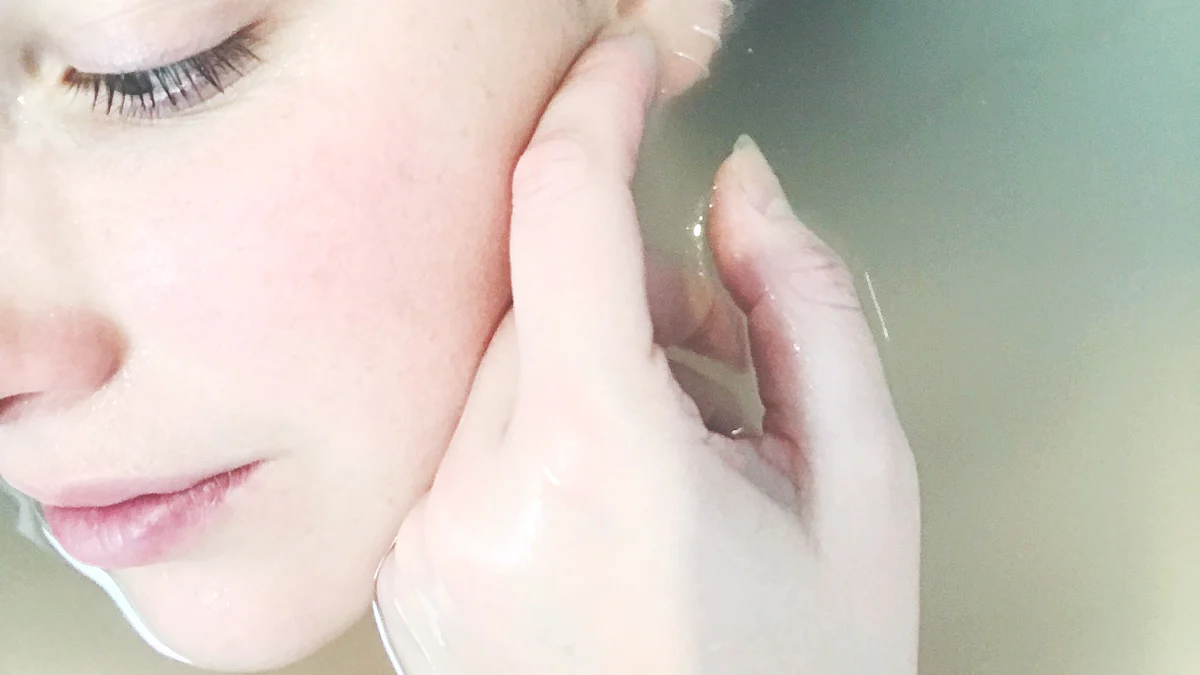Discover Your Skin Type: The Ultimate Guide to Skincare

Understanding your skin type is essential for maintaining healthy and radiant skin. By identifying whether you have oily, dry, normal, combination, or sensitive skin, you can tailor your skincare routine to address specific concerns effectively. Knowing your skin type enables you to choose the right products that cater to your derma's unique needs, promoting a clear and youthful complexion. In this blog, we will delve into the different skin types, their characteristics, and provide expert tips on how to care for each type properly.
Understanding Skin Types

What Are Skin Types?
When it comes to skin types, understanding the variations is key to crafting an effective skincare routine. Genetics play a significant role in determining your skin type, influencing the production of proteins that are vital for skin health. As dermatologists explain, genes impact the proteins in your body, with the skin being predominantly composed of these essential elements. Each protein serves a specific function, highlighting the genetic influence on overall skin health.
Sensitive skin, often linked to conditions like eczema or rosacea, is primarily genetic. This predisposition can lead to heightened reactivity and specific care requirements. The unique characteristics of each skin type are not only influenced by genetics but also by various external factors.
Different Skin Types
The primary skin types - oily, dry, normal, combination, and sensitive - each come with distinct characteristics that require tailored care. Oily skin tends to produce excess sebum, leading to a shiny complexion and potential acne concerns. Dry skin lacks moisture, often feeling tight and rough to the touch.
Normal skin strikes a balance between oily and dry tendencies, maintaining adequate hydration levels without excessive shine or dryness. Combination skin presents a mix of both oily and dry areas on the face, requiring targeted treatments for each zone.
Sensitive skin demands gentle products due to its heightened reactivity and susceptibility to irritation. Understanding these distinctions allows you to choose appropriate skincare products that cater specifically to your derma's needs.
Factors Affecting Skin Types
Beyond genetics, several other factors can influence your skin type. Age, illness, medication, environmental exposures, and lifestyle choices all play a role in shaping how your skin behaves over time. These external elements can impact the intensity and pace of different aging phenotypes across age groups and ethnicities.
By considering both genetic predispositions and external influences on your derma, you can better comprehend its unique requirements for optimal care.
Identifying Your Skin Type
Simple Tests to Determine Your Skin Type
Discovering your skin type at home can be a simple yet enlightening process. By conducting easy tests, you can gain valuable insights into your derma's unique characteristics and needs. Here are some straightforward methods to help you identify your skin type:
The Bare-Faced Test: Start by washing your face with a gentle cleanser and patting it dry. Leave your skin untouched for about an hour, allowing its natural oils to resurface. Afterward, observe how your skin feels and looks:
If your complexion appears shiny all over, you likely have oily skin.
Dry, tight-feeling skin indicates a dry skin type.
Balanced hydration without excess shine or dryness suggests normal skin.
Oily areas around the T-zone and dryness on the cheeks point to combination skin.
Reactivity, redness, or irritation signal sensitive skin.
The Blotting Paper Test: Gently pat blotting paper on different areas of your face:
Excessive oil on the paper signifies oily skin.
Little to no oil but possible flakes indicate dry skin.
Oil only in specific zones like the forehead or nose reveals combination skin.
The Touch Test: Run clean fingers along your face after cleansing:
Smooth and supple texture denotes normal or balanced skin.
Rough patches or tightness suggest dryness.
Uneven texture with both oily and dry areas signifies combination derma.
By performing these tests regularly, you can track changes in your derma's behavior and adjust your skincare routine accordingly.
Professional Skin Analysis
While at-home tests provide valuable insights, seeking a professional skin analysis offers a comprehensive understanding of your derma's needs. Professional assessments utilize advanced tools like *Dermalogica's Face Mapping*, a revolutionary technique that divides the facial landscape into fourteen zones to identify various conditions such as congestion, dehydration, breakouts, and hyperpigmentation.
Face Mapping not only pinpoints current concerns but also delves into the past of your derma, providing insight based on Chinese Diagnosis philosophy. This personalized approach allows skincare experts to tailor treatments specifically to address individual issues effectively.
Moreover, personalized solutions by Dermalogica offer custom skincare regimens designed to work seamlessly with your lifestyle. By combining expert analysis with innovative products tailored to your unique needs, you can embark on a skincare journey that nurtures and enhances the natural beauty of your derma.
Skincare Tips for Each Skin Type

Oily Skin
When dealing with oily skin, it's crucial to choose the right products and establish a consistent routine to manage excess sebum production effectively. Look for oil-free cleansers and non-comedogenic moisturizers to prevent clogged pores and breakouts. Incorporating a gentle exfoliator with salicylic acid can help unclog pores and reduce oiliness. Additionally, consider using a mattifying primer before applying makeup to control shine throughout the day.
Maintaining a healthy diet rich in antioxidants and drinking plenty of water can also benefit oily skin by regulating oil production from within. Remember, over-washing or using harsh products can strip your skin of essential oils, leading to rebound oiliness. Strike a balance by cleansing twice daily with a mild face wash and following up with a lightweight, hydrating moisturizer.
Dry Skin
Hydrating products are essential for nourishing and replenishing moisture in dry skin. Opt for creamy cleansers that won't strip away natural oils and look for ingredients like hyaluronic acid or glycerin in your moisturizers to lock in hydration. Consider incorporating a weekly hydrating mask or facial oil into your routine to provide an extra boost of moisture.
To combat dryness, avoid hot showers that can further dehydrate your skin and opt for lukewarm water instead. Pat your skin dry gently after cleansing and apply moisturizer while your skin is still damp to seal in moisture effectively. Investing in a humidifier can also help maintain optimal indoor humidity levels, preventing dry air from exacerbating skin issues.
Combination Skin
Managing combination skin involves finding the right balance between addressing oily zones while providing adequate hydration to dry areas. Start by using a gentle cleanser suitable for all skin types to avoid stripping natural oils excessively. For oily areas like the T-zone, consider incorporating a lightweight gel-based moisturizer that won't feel heavy or greasy.
When selecting products for combination derma, look for formulas labeled as "non-comedogenic" to prevent pore congestion in oily regions.
Sensitive Skin
When it comes to sensitive skin, it requires gentle care and specialized products to soothe and protect its delicate nature. Individuals with sensitive skin often experience heightened reactivity, leading to redness, irritation, or even allergic reactions when exposed to certain ingredients or environmental factors. Understanding how to manage sensitive skin is crucial in maintaining a healthy complexion without triggering adverse responses.
For individuals with sensitive skin, opting for products that are free from harsh chemicals, fragrances, and known irritants can help reduce redness and discomfort. Look for skincare items labeled as hypoallergenic or fragrance-free to minimize the risk of adverse reactions.
Incorporating calming ingredients like aloe vera, chamomile, or green tea extract can help soothe sensitive skin while providing hydration and protection against external aggressors. These natural elements possess anti-inflammatory properties that aid in reducing redness and soothing irritated derma.
By choosing gentle formulations tailored for sensitive derma, you can create a skincare routine that nurtures your complexion without causing discomfort or flare-ups. Remember to perform patch tests before incorporating new products into your regimen to ensure compatibility with your specific needs.
Conclusion
In the realm of skincare, understanding your skin type is akin to unlocking the secret code to a radiant and healthy complexion. By identifying whether you fall into the categories of oily, dry, normal, combination, or sensitive skin, you pave the way for a personalized skincare regimen that caters to your derma's unique needs. Armed with this knowledge, you can navigate the vast landscape of beauty products with confidence, selecting those that harmonize perfectly with your skin's characteristics.
As we've explored the intricacies of different skin types and their specific requirements throughout this guide, it becomes evident that no two skins are alike. Each individual possesses a distinct canvas that demands tailored care and attention. Whether you're combating excess oiliness, battling dry patches, or soothing sensitive reactions, there exists a plethora of solutions designed to address your concerns effectively.
Anonymous Customer shared their journey of discovering the perfect cleanser for sensitive combination skin—a product that not only cleanses but also soothes without causing irritation. This anecdote underscores the importance of finding skincare gems that align with your skin's temperament.
Furthermore, Anonymous Customer's experience with a hydrating product highlights the significance of maintaining optimal moisture levels for individuals grappling with rosacea and combination skin. Hydration emerges as a common theme in skincare routines aimed at nourishing and revitalizing derma.
Incorporating feedback from Anonymous Customer, who found solace in a gentle cleanser suited for sensitive combination skin, reinforces the notion that gentleness is key when dealing with reactive complexions. The delicate balance between addressing concerns like acne/oily zones while preserving hydration is paramount in achieving skin harmony.
Lastly, Anonymous Customer's review of a cleansing gel underscores how incorporating suitable products can transform one's skincare routine. The refreshing scent coupled with visible improvements in tone and hydration exemplifies the transformative power of well-chosen skincare essentials.
In conclusion, embarking on a skincare journey tailored to your unique skin type is not merely about vanity; it's an act of self-care and empowerment. Your derma deserves to be treated with kindness and respect—nurtured by products that understand its language and respond accordingly. Remember, your skin tells a story; make sure it narrates one filled with radiance, health, and confidence.
See Also
Exploring Digital Solutions for Enhancing Skin Health
Debunking Skincare Myths with Science
How Nutrition Influences Skin Radiance
